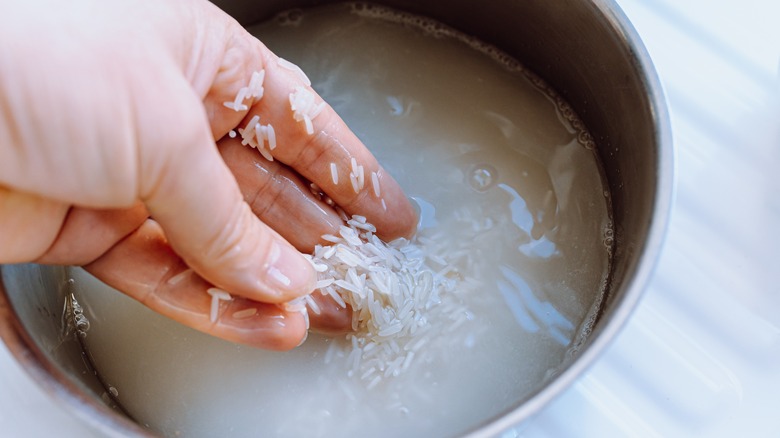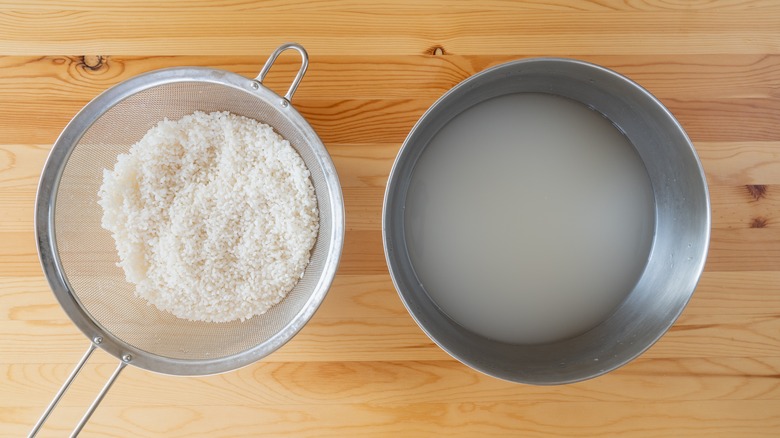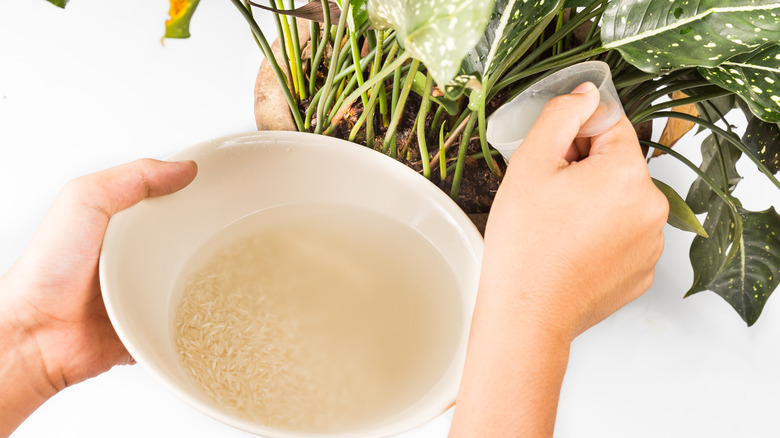You Should Stop Throwing Out Your Rice Water
The first step of cooking most things is washing them clean, and that means knowing what needs to be rinsed and what doesn't, including rice. While some things are given a quick rinse under running water to remove dirt, muck, and dust (like fruits and veggies), grains such as rice require multiple washes and need to be gently rubbed by hand in order to purify them for cooking. This is because rice contains a lot of starch, which can make your grains gummy, clumpy, and sticky rather than loose and fluffy if the starches are not removed.
While rinsing rice multiple times is important — unless you're making risottos or sushi that require the rice to be sticky — you might want to think twice before throwing away the water that is used to clean it. Doing so means you're pouring precious starches right down the drain that could improve other dishes.
Much like pasta water that is saved to emulsify sauces, the starchy water leftover from rinsing rice is packed with flavor and can be used to thicken liquids like stews and soups. Rice water can absorb fishy smells, too, and even be used as an effective cleaning solution around the house, or applied as a beauty product on your hair and skin. But, it's important to note that rice water from different stages of washing is best used for different purposes.
How to use rice water when cooking
Saving rice water may seem like a clever trick that can improve certain dishes, but it's actually a time-honored practice that happens to be the base of several Asian dishes. Known as ssal tte mul, or rice starch water, in Korea, the starchy liquid is the key ingredient in many Korean soups and stews including doenjang jjigae (soybean paste stew) and kimchi jjigae (kimchi stew). Rice water helps to thicken these watery blends and ties all the flavors together while also adding a subtle nutty flavor.
The starchy water becomes even more important in stews that don't have any meat in them, to add depth or thicken the liquid (since there's no gelatin from animal products available). This is why rice water is vital in the meat-free version of the sour Filipino soup sinigang, made from tamarind. Plus, soaking fish — especially cold-water ones like sardines — in rice water can rid them of their funky, piscine stench as can draw out excess salt. Rice water can even tone down the sharpness of bitter vegetables when used as a balancing liquid and it can accelerate fermentation of pickles and make them crisper.
When using rice water in cooking, however, one thing to keep in mind is that you don't want to use the cloudy liquid from the first few washes since it's bound to be filled with dirt and debris that will enter your food. Instead, save that for other uses around the house and use the latter, more purified batches of liquid for cooking purposes.
Rice water can also be used around the house
Rice water is a valuable liquid in cooking, but it's just as prized for its non-culinary uses around the house too. In fact, the debris from the first two rounds of washes can actually be quite beneficial, and has long been used as an abrasive cleaner in some households to wipe down everything from countertops and appliances to crockery and cookware like woks. That said, rice water has a pH level of six, which isn't acidic enough to cut through caked-on layers of grease and stubborn fat as that requires acids with a pH over eight, so you'll want to divert to more traditional options for those purposes.
Rice water also happens to be a natural fertilizer that can be sprayed onto indoor houseplants like succulents or poured into the soil to help them grow. When watering houseplants with rice water, however, be sure to check what your plant needs first. The acidity of rice can get in the way of plants that don't do well with excess nitrogen, and pouring rice water more than once a month on these types may encourage the growth of bacteria.
Moreover, using starchy rice water as a fabric conditioner is also the secret to crisp and wrinkle-free linens like sheets and pillowcases usually found at high-end hotels — who would've thought that the milky liquid usually poured down the drain after washing rice could have such uses?



